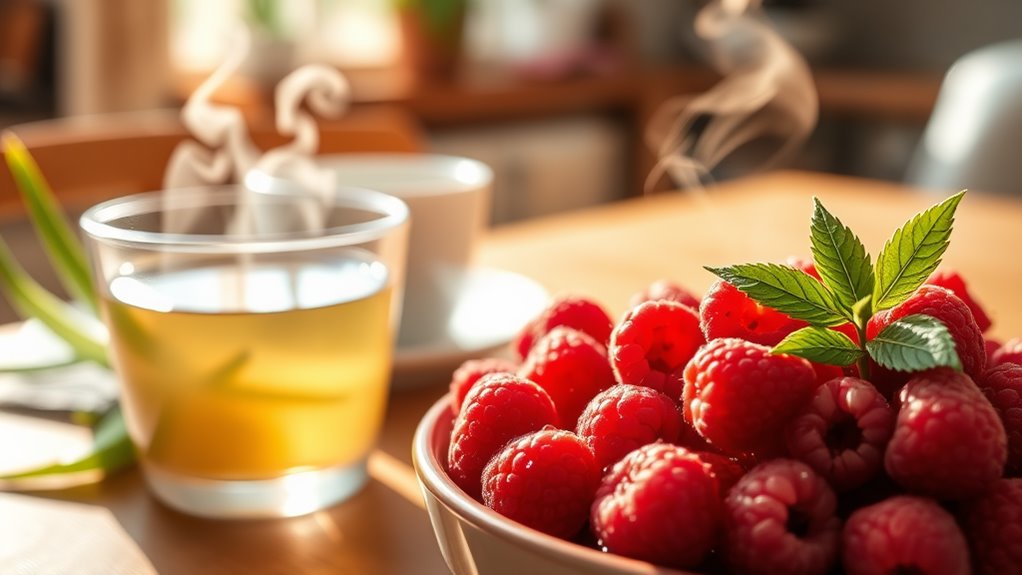Try These Gentle Tricks for Constipation Without Harsh Meds
If you’ve ever struggled with constipation, you know how uncomfortable it can be. Fortunately, there are gentle, natural methods to find relief without resorting to harsh medications. Staying hydrated, boosting your fiber intake, and incorporating light exercises are just a few strategies that can help. But what about the role of gut health and relaxation techniques? Discover how these elements can further support your digestive system and promote regularity.
Key Takeaways
- Stay hydrated by drinking at least eight 8-ounce glasses of water daily, and include herbal teas for added benefits.
- Incorporate fiber-rich foods like whole grains, fruits, and vegetables to enhance digestion and alleviate constipation.
- Engage in regular exercise such as walking or yoga to stimulate gut activity and improve bowel movements.
- Add probiotics to your diet through yogurt or fermented foods to support gut health and regularity.
- Practice relaxation techniques like deep breathing and gentle yoga to reduce stress and promote digestive ease.
Stay Hydrated: The Importance of Water
When it comes to preventing constipation, staying hydrated is essential. Drinking enough water helps soften your stool, making it easier to pass. Aim for at least eight 8-ounce glasses daily, but listen to your body’s needs. If you’re active or it’s hot outside, you might need more. Herbal teas and clear broths can also contribute to your hydration. Additionally, adequate hydration is crucial for maintaining regular bowel movements and preventing discomfort. If you’re struggling with constipation, these simple hydration strategies can serve as effective constipation remedies.
Fiber-Rich Foods to Include in Your Diet
A balanced diet rich in fiber can greatly improve your digestive health and help prevent constipation. Include foods like whole grains, fruits, vegetables, and legumes in your meals.
Oats, brown rice, and quinoa are excellent choices for grains. For fruits, think apples, pears, and berries, which aren’t only tasty but also packed with fiber.
Vegetables like broccoli, carrots, and spinach offer essential nutrients alongside their fiber content. Don’t forget legumes such as lentils, chickpeas, and black beans; they’re fiber powerhouses. Additionally, aiming for 25 to 30 grams of fiber daily can significantly enhance your digestion and help alleviate constipation.
Gentle Movement: Exercise for Digestive Health
Gentle movement can work wonders for your digestive health. Incorporating yoga poses and regular walks into your routine can stimulate digestion and relieve constipation. Additionally, gentle yoga poses can effectively promote movement in the digestive system, aiding in relief from discomfort. Let’s explore how these simple exercises can help you feel more comfortable and balanced.
Yoga Poses for Relief
Looking for a natural way to ease constipation? Yoga can be a gentle yet effective solution. Poses like Child’s Pose and Cat-Cow stimulate digestion and relieve tension in your abdomen.
Try the Seated Forward Bend to stretch your lower back while encouraging bowel movement. The Wind-Relieving Pose, as the name suggests, is excellent for releasing trapped gas and promoting comfort.
Remember to breathe deeply throughout your practice; this enhances relaxation and helps your digestive system function better.
Incorporate these poses into your routine, and you may find relief without the need for harsh medications.
Walking for Digestion
Incorporating movement into your daily routine can greatly enhance digestion, and walking is one of the simplest yet most effective forms of exercise.
Just a brisk walk can stimulate your digestive tract and alleviate constipation.
Here are four ways walking can help:
- Boosts Blood Flow: Increased circulation aids nutrient absorption.
- Stimulates Gut Activity: Gentle movement encourages bowel movements.
- Reduces Stress: Walking can lower anxiety, improving digestive function.
- Supports Weight Management: Maintaining a healthy weight can prevent digestive issues.
The Power of Probiotics: Supporting Gut Flora
Probiotics play an essential role in maintaining a healthy gut flora, which can greatly improve your digestion and help relieve constipation.
By incorporating sources of probiotics like yogurt, kefir, or fermented vegetables into your diet, you can boost your gut health. Regular consumption of probiotics can lead to fewer digestive issues, including bloating and discomfort.
Let’s explore the benefits of these powerful microorganisms and how they can support your digestive system.
Benefits of Probiotics
A diverse and balanced gut flora plays an essential role in maintaining digestive health, and that’s where probiotics come into the picture.
These beneficial bacteria offer several advantages:
- Promote regular bowel movements – They help maintain a healthy digestive rhythm.
- Enhance nutrient absorption – Probiotics support your body in absorbing essential vitamins and minerals.
- Boost immunity – A healthy gut flora strengthens your immune system, warding off illness.
- Reduce bloating and discomfort – Probiotics can alleviate gas and bloating, making you feel more comfortable.
Incorporating probiotics into your routine can truly support your digestive well-being.
Sources of Probiotics
Finding sources of probiotics is easier than you might think. You can enjoy these beneficial bacteria through various foods.
Yogurt is one of the most popular sources, packed with live cultures. Fermented foods like kimchi, sauerkraut, and miso also offer a probiotic boost. Try kefir, a tangy milk drink, or kombucha, a fizzy tea that’s not only invigorating but gut-friendly.
If you prefer supplements, look for high-quality probiotic capsules or powders.
Incorporating these sources into your diet can support your gut flora, helping to alleviate constipation and promote overall digestive health. It’s a simple, tasty way to feel better!
Relaxation Techniques to Ease Tension
Here are four effective relaxation techniques to try:
- Deep Breathing: Focus on inhaling deeply through your nose and exhaling slowly through your mouth to reduce stress. Incorporating unconventional breathing techniques can further enhance relaxation and promote digestive ease.
- Progressive Muscle Relaxation: Tense and release different muscle groups to relieve physical tension.
- Gentle Yoga: Practice gentle stretches and poses to enhance relaxation and stimulate digestion.
- Mindfulness Meditation: Spend a few minutes each day focusing on the present moment to calm your mind.
Herbal Remedies: Natural Options for Relief
While relaxation techniques can help ease tension and promote digestive health, herbal remedies offer another natural approach to relieving constipation.
Consider incorporating senna, a well-known laxative herb, or flaxseed, rich in fiber and omega-3s, into your diet.
Aloe vera juice is another option; it can stimulate digestion and soften stools.
You might also try peppermint tea, which can soothe the digestive tract.
Always drink plenty of water when using these remedies.
Remember to consult with a healthcare professional before starting any herbal treatment, especially if you’re pregnant or on medication.
Additionally, incorporating probiotics into your diet can enhance gut health and further support digestion.
Natural relief is achievable with the right herbs!




